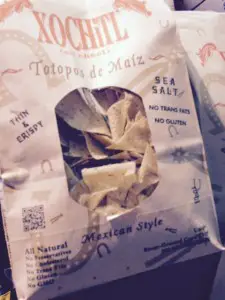The trend toward sourcing non-GMO ingredients has been a promising one for the American consumer, but the rising demand for non-GMO products also brings with it the potential for mistakes, or even outright fraud.

Note the “Non GMO” claim on the bottom left that Consumer Reports research has shown as being false.
While more and more companies and favorite food products are going non-GMO, they still have to wrestle with the fact that America is by far the biggest GMO-producing country, with over 90% of its soy currently genetically modified and almost 90% of its corn as well.
One of the most effective things food companies can do to increase sales is take remove any reservations consumers may have about their products, and whether or not they contain GMO ingredients is one of the biggest reservations food consumers have today.
The tortilla chip company Xochitl has gained a foothold in grocery stores across the United States in large part because of two words added to its package to reassure consumers: “No GMO.” It’s website shows that the chips are now in grocery stores across the country, and both organic and non-organic varieties are offered (both say “No GMO” on the bag.
But according to a recent test conducted by Consumer Reports that actually found its way to the mainstream media (article and video here), the company has been lying about that important distinction.

Consumer Reports Investigation Finds Evidence of Fraud from Xochitl
Despite the non-GMO claims by Xochitl (pronounced “so-cheel”) and their Totopos de Maiz original corn chips, the recent Consumer Reports investigation found that the non-organic (supposedly non-GMO) varieties of the chips contain over 75% GMO corn, over a test of six different packages.
Corn of the GMO variety was found in each type of the chips, despite the No GMO and “all-natural” labels on the front of the packages.
According to this article from the ‘Food Babe’ Vani Hari, the Consumer Reports report did find that USDA Organic and Non-GMO Project Verified labels are trustworthy when it comes to avoiding GMOs.
But the Xochitl finding raises the question of whether or not we can trust unverified claims.
Should You Trust Non-Verified “No GMO” Claims?
Also according to the Consumer Reports report, which can be read in its entirety here, the majority of samples from companies that make unregulated non-GMO claims contained about 0.9% GMO corn or soy on average.
So while such claims may give you a better chance of avoiding GMOs, it’s important to remember that they are not regulated in any way, and to choose products with the aforementioned labels that are verified whenever possible.
It’s also important to note that “All Natural” products had comparable levels of GMO corn or soy to their “conventional” counterparts according to Consumer Reports; in other words the label is virtually meaningless if you want to avoid GMOs.
Source:
http://althealthworks.com/4116/popular-nationwide-tortilla-chip-company-busted-by-consumer-reports-for-false-no-gmo-labels/

Note the “Non GMO” claim on the bottom left that Consumer Reports research has shown as being false.
While more and more companies and favorite food products are going non-GMO, they still have to wrestle with the fact that America is by far the biggest GMO-producing country, with over 90% of its soy currently genetically modified and almost 90% of its corn as well.
One of the most effective things food companies can do to increase sales is take remove any reservations consumers may have about their products, and whether or not they contain GMO ingredients is one of the biggest reservations food consumers have today.
The tortilla chip company Xochitl has gained a foothold in grocery stores across the United States in large part because of two words added to its package to reassure consumers: “No GMO.” It’s website shows that the chips are now in grocery stores across the country, and both organic and non-organic varieties are offered (both say “No GMO” on the bag.
But according to a recent test conducted by Consumer Reports that actually found its way to the mainstream media (article and video here), the company has been lying about that important distinction.

Consumer Reports Investigation Finds Evidence of Fraud from Xochitl
Despite the non-GMO claims by Xochitl (pronounced “so-cheel”) and their Totopos de Maiz original corn chips, the recent Consumer Reports investigation found that the non-organic (supposedly non-GMO) varieties of the chips contain over 75% GMO corn, over a test of six different packages.
Corn of the GMO variety was found in each type of the chips, despite the No GMO and “all-natural” labels on the front of the packages.
According to this article from the ‘Food Babe’ Vani Hari, the Consumer Reports report did find that USDA Organic and Non-GMO Project Verified labels are trustworthy when it comes to avoiding GMOs.
But the Xochitl finding raises the question of whether or not we can trust unverified claims.
Should You Trust Non-Verified “No GMO” Claims?
Also according to the Consumer Reports report, which can be read in its entirety here, the majority of samples from companies that make unregulated non-GMO claims contained about 0.9% GMO corn or soy on average.
So while such claims may give you a better chance of avoiding GMOs, it’s important to remember that they are not regulated in any way, and to choose products with the aforementioned labels that are verified whenever possible.
It’s also important to note that “All Natural” products had comparable levels of GMO corn or soy to their “conventional” counterparts according to Consumer Reports; in other words the label is virtually meaningless if you want to avoid GMOs.
Source:
http://althealthworks.com/4116/popular-nationwide-tortilla-chip-company-busted-by-consumer-reports-for-false-no-gmo-labels/

.jpg)

Post a Comment